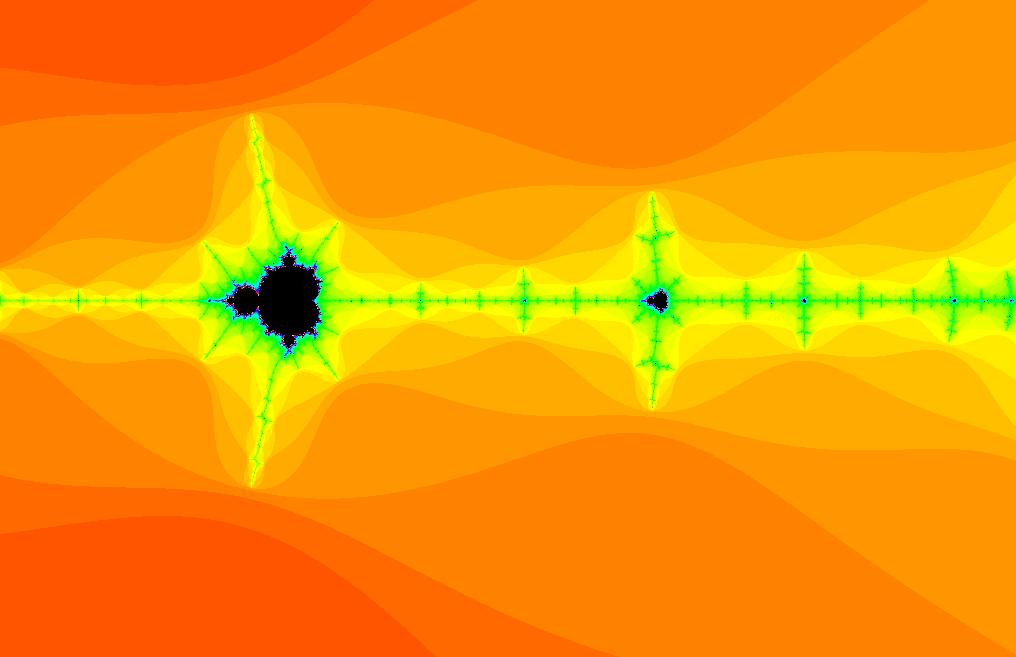the Anthroposophical
Society, Money,
and a very necessary spiritual Revolution

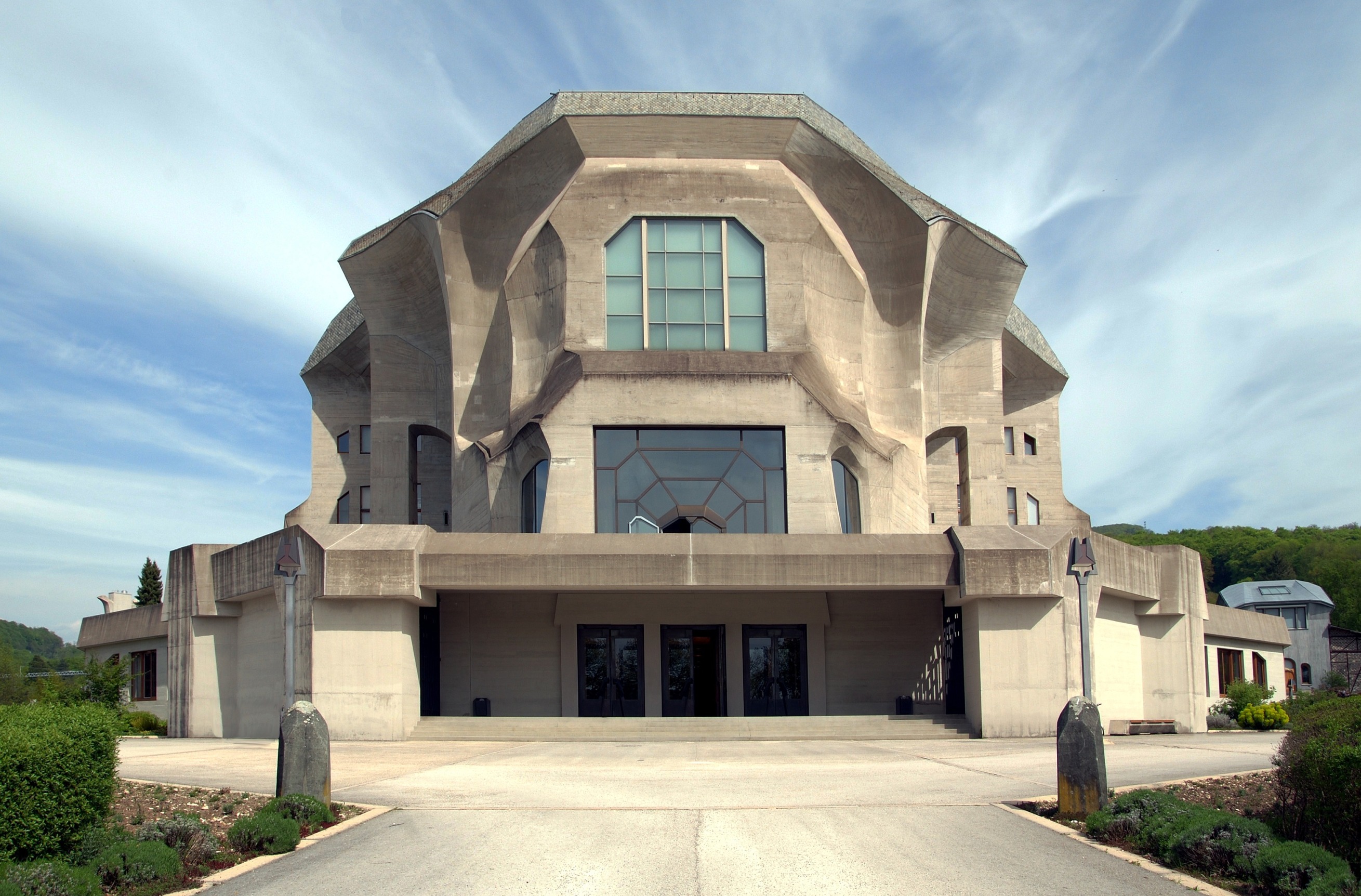
Original Goetheanum
- soft curves became straight lines and hard angles -
Goetheanum after the fire
The Society, like many modern institutions in this era of
chaotic economic processes, has suffered recently from a loss
of income. Mostly this has to do with the drying up (to
a degree) of what is called: gift money. The
Society was overly dependent upon gift money, and has had to
cutback services and employees in order to balance its
books. There are some who blame the current leadership,
and want that leadership replaced, but the social reality is
itself pregnant with another solution for those with eyes to
see and ears to hear.
The spiritual world, in the form of the community of Beings
that are part of what Rudolf Steiner called: the
Anthroposophical Movement, has not abandoned our work.
At the same time, by its own rules, this spiritual
Anthroposophical Movement must work through
human beings. Human beings must attend to the needed new
inspiration, otherwise the Movement cannot help the
Society. It is a question fundamentally of human
freedom.
Right now the basic blocking gesture within the Society is the
inability to be awake to something Steiner predicted: the
Culmination and the related karmic tensions between what
Steiner characterized as the Aristotelians and the
Platonists. An earlier effort to illuminate these
riddles was done by Stephen Usher, and then a later one by the
myself. My article (see the end of this missive) has a
link Usher’s essay.
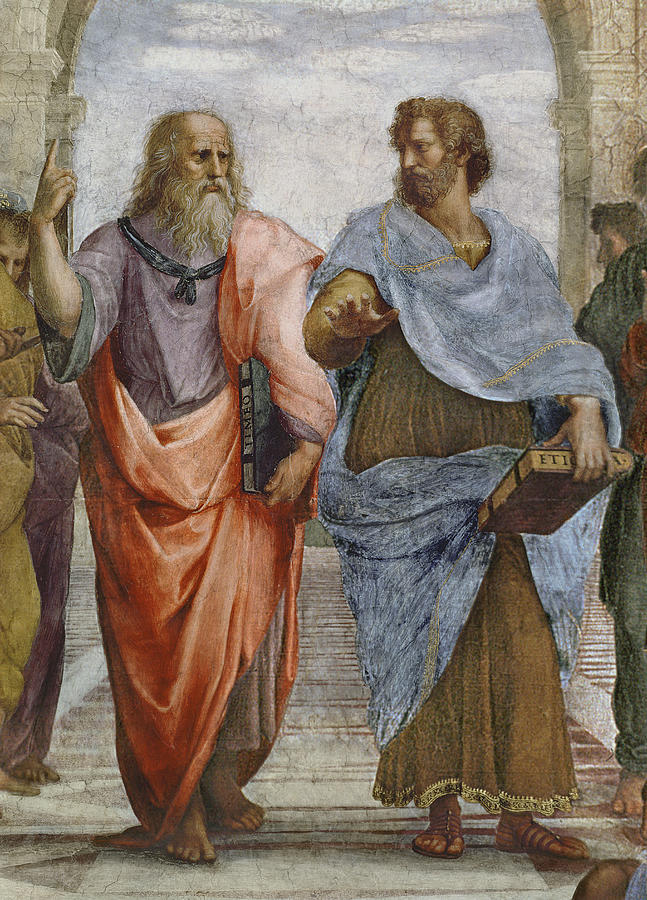 detail, Raffaello Sanzio of Urbino's School of Athens
painting
detail, Raffaello Sanzio of Urbino's School of Athens
painting
Plato on the left, and Aristotle on the right
- notice the contrasting gestures of the right hands
That should not be surprising if one thinks about this
carefully. The plain fact this speaks to is that the
Aristotelians will not be able to receive the help of the
Platonists, if the former do not in some fashion discover how
to invite the latter into a Way of co-working. This
invitation need not go so far as to place Platonists into
positions of institutional power - the intercourse need only
happen at the level of an exchanges of concepts that can begin
to take place merely through reading.
As to what other Platonists might offer (or have already
offered), my article has a few details. Here I will only
speak for myself.
In my experience the most profound scientific question of our
time concerns whether it is true or not that the mind and the
brain are the same. If we get that wrong, our whole
understanding of the nature of thinking and of the human being
remains trapped in the Ahrimanic Deception (Enchantment).
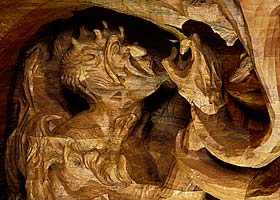 detail, Ahriman: Steiner's Representative of Humanity
detail, Ahriman: Steiner's Representative of Humanity
Yes, there is brain-bound thinking, but sense-free thinking is
not brain-bound. Is the human being free of his biology,
or its prisoner? What is even more tragic, is that if we
successfully practice The Philosophy of
Spiritual Activity, we become able to perceive
that ordinary thinking is not always brain-bound, but has
constant moments of transcendent encounters with spirit.
Constant. Brain-bound is not a fixed condition, and
ordinary consciousness continuously has sense-free
experiences. We mostly just sleep through these experiences,
not having developed the orientation Steiner called: the
exceptional state. This orientation comes about because
we study our personal inner world with the same scientific
empiricism we apply to the sense world.
What more fundamental questions could there be then, and,
sadly, it is clear that the institutional Centers of
anthroposophical work don’t even know enough to face it.
Mostly Steiner is quoted, and patterns and habits of thought
live on without any sense that a truly living Society would
naturally evolve. Ours does not. Even the
architecture became rigid.
Upon the appreciation of this concept/riddle of the meaning of
our existence (matter or spirit), then follows our whole
ability to establish what is going on in history, in
civilization, and in all the most intimate aspects of our
social/political lives. This tension between
materialistic science and a new religious-like scientific
revelation as to the true nature of thinking is at the heart
of the becoming of the Third Millennium.
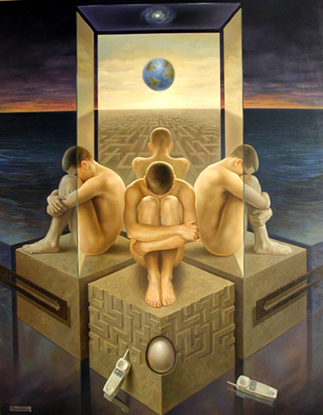 Door to Third Millennium, Painting by Latin American
Painter Alberto Pancorbo
Door to Third Millennium, Painting by Latin American
Painter Alberto Pancorbo
So we see then, everywhere, processes where what Steiner
called the “group soul” are being broken down, freeing the
individual from those binding traditional moral rules (not
peace, but a sword). These processes do not,
however, proceed at the same rate over time, nor exist
everywhere in the same state or nature. As a
consequence, in America we tend to have more individualism,
and in other places less. Further, the individualism in
America impacts the rest of the world with cultural artifacts
that increase elsewhere the breaking down of the group soul,
such as the social macro-effect of rock ‘n roll music (and
more recently hip-hop) as it passed into the larger world over
time. These arts help the young separate from the
traditions of their elders, and when we read the rest of the
statement of Christ’s, the whole begins to reveal a remarkable
shape:
Matthew 10:34-40: “Don’t think I came to cause peace
across the land. I didn’t come to cause peace, I came
to wield a sword, because I came to divide a man against his
father and a daughter against her mother and a bride against
her mother-in-law, and to make a man’s servants his
enemies. Whoever prefers father or mother over me is
not worthy of me; and whoever prefers son or daughter over
me is not worthy of me; and whoever does not take his cross
and follow after me is not worthy of me. Whoever found
his life will lose it, and the one who lost his life because
of me will find it. Whoever receives you receives me,
and whoever receives me, receives my Sender.”
This undercurrent is the spiritual macro-stream working
outward from within the great and grave seas of change we see
everywhere. It is nothing less that a direct encounter
between humanity and the Cosmic Christ: the Lord (artist) of
Karma. This encounter takes place inwardly, not in the
outer circumstances, which mostly serve as a goad to inner
waking up. Ahriman already possesses the raw intellect
(his natural realm), and it is up to human individuals to
wrest from Ahriman this moral core of the soul, and infuse it
with the forces of Christ: Not I, but Christ in me.
This wresting is being done everywhere, as can be seen in such
works as: Blessed Unrest, by Paul Hawken.
If the Aristotelians can grasp this fact, then they can begin
to perceive related social processes, which have been finely
detailed in many of my writings. This is essentially new
knowledge, and can be a great help to the Society in the
navigation of many of the coming changes. Not only that,
but this kind of knowledge (including how it is arrived at via
a more conscious - and less instinctive - sense-free
thinking) is something desired by many in the world who are
not (nor need to be) as fond as we are of Rudolf
Steiner.
 a collection of concepts from various think tanks: image
by Many
Eyes
a collection of concepts from various think tanks: image
by Many
Eyes
We should not teach Steinerism (a world view that dominates
the Society, and is not a science), nor should we teach just
the content of the daughter movements. Instead we teach
(and ourselves learn more about) the truly fundamental
questions: What really is the full potential of mind, and how
would such a mind describe the social realities humanity now
faces? Once we awake to the spirit in the mind, then
perceiving the spirit everywhere else naturally follows.
Nature, for example, has an inside just as do
we. Yet, the best way to appreciate that requires us to
first be more awake in our own inside.
As long as the Aristotelians assume that their business is
creating more lovers of all things Steiner, while maintaining
their own institutional positions and prerogatives, they have
not seen and not heard. At the same time, careful
observation of the Society, as a social form, reveals that
Steiner, in fostering local Branches and Study Groups, made it
possible for the membership and the friends to become
completely free of the limits of our institutional centers,
such as in Dornach and the Councils in America.
Nothing less than a social/spiritual revolution in terms of
how the Society is led is called for. In fact, in accord
with our Age, the more ancient (Third Cultural Epoch)
hierarchical social forms are dying, and being replaced by
circle-like (Fifth Cultural Epoch) social forms within the
social commons. Dornach, which is very hierarchical at
the level of concepts - such as by decreeing the theme of the
year, is no longer capable of providing viable leadership, and
it is the local Branches that need to assert themselves so as
to freely determine their own courses of action.
If Dornach and the Councils in America knew what they were
doing, I wouldn't have to write this stuff, which is obvious
to an awake thinking.
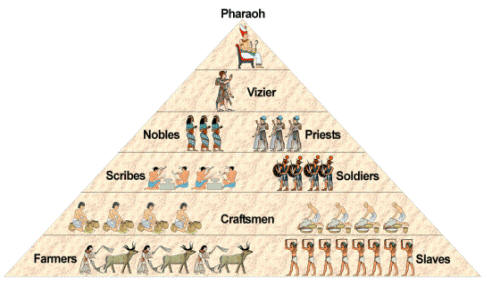
 third epoch social form with Steiner's ghost at the top
fifth epoch social form
with the Youth Section
third epoch social form with Steiner's ghost at the top
fifth epoch social form
with the Youth Section
in the center of a squared circle
It isn’t necessary to wait for the various Centers to give the
Branches in the Periphery the permission to create viable and
profitable adult education centers in which the Platonists’
wisdom can be added to the Aristotelian wisdom (solving the $$$
money $$$ problem at the local level -
see note 1). All over the world there is a hunger,
living in those outside the Society, to find their individual
Way. But all local social problems need to receive a
local solution. Neither Steiner or Dornach are to tell
us what to do. A local adult education center teaching
the practices of truly free thinking enables everyone to
contribute.
The intercourse between the Platonists and the Aristotelians
is discussed in my paper noted below. The former live
mostly in the Idea as a concrete experienced reality, while
the latter live mostly in the abstract concept. The only
caveat as to working out this necessary intercourse is for the
members and friends to reduce their reliance on Steiner-said,
and replace that with greater personal cognitive activity: the
will-in-thinking.
For example, imagine how you would feel were you to go to a
heart surgeon needing his/her services for your child, and
during the time when this operation was being explained to
you, the surgeon kept quoting his/her teachers as if they had
no confidence in their own skills. The world cannot
receive this wisdom if it does not come from our own insights
and practices, without Steiner’s name everywhere
attached. To others this reliance on Steiner will seem
like a crutch, and we ourselves will appear to be spiritually
lame.
Among each other, yes, Steiner is relevant (along with a lot
of others who have contributed to our understanding and
knowledge of the world, again see my essay on the Culmination
below on who were some of the 20th and 21st Century
Platonists). But to the world, the references to Steiner
will effectively murder any chance we have to be true
helpers. You need to be the teacher yourself.
There is no other Way. The fundamental revolution is
individual.
Let us here take a brief look at the problem of Steiner-said
in a more intimate soul-fashion.
When we think, and write or are in conversation, our minds
(mostly by unconscious habits of associative thinking) often
defer to Steiner, with the result that we stop actually
thinking and our “I” turns to memory in order to retrieve the
quoted material. Anyone listening to us, that is not
already in our camp, gets confused. They will be more
interested in what you think for yourself, than in the
thoughts of some dead spiritual guru. They don’t know or
value Steiner, and often become less inclined to know Steiner
when they meet us as students unable to think outside the dead
bones of Steiner-thought.
This excessive quoting of Steiner has created all kinds of
social problems, particularly in Waldorf and
Biodynamics. For example, I use “Google news” to search
daily for references to Waldorf and to Biodynamics. In
almost all cases, where Steiner is heavily
quoted, the reporter/writer dismisses the information being
provided, wanting quite naturally to hear these matters of
spirit discussed with an awareness of the related scientific
questions. Where the teacher or farmer speaks from their
own experience, the situation is otherwise. Not enough
anthroposophists have made themselves familiar with the
Aristotelian Steiner’s philosophical and epistemological
works, or with the works of the Platonist Owen Barfield on
language and the evolution of consciousness.
Understanding both those contributions to human understanding
is necessary in order to acquire the ability to present our
work, in the context of the scientific age. When we
can't, it turns us into holders of just one more belief
system.
The main religious-like point of view of our Age is natural
science. If we are to help people grow past its
present-day limits, we need to be well aware of the nature of
those limits. One of our limits is our belief that
reading a Steiner text delivers knowledge. It does not.
A text only provides concepts (perhaps leading to
understanding), but in the absence of the percepts
(experiences) that go with the concepts, there is no knowledge
(as established in Steiner’s The Philosophy of
Spiritual Activity.
Knowledge then, can be born of an intercourse within each
individual of both the Platonist and the Aristotelian
inspirations. But this “knowledge” is only possible for
our personal experiences. Reading about Christ is very
different from having a direct experience of Christ.
Real direct knowledge of this type belongs not to the
Society, but to the world as a free act in local centers of
adult education. We don’t need more members in the
Society. We just need to be good participants in the
seas of change involving everyone in the world - participants
who speak from their own personal experience, and who feel no
compulsion at all to rely upon or to sell Steiner-said
(Steinerism).
All of us have a lot to share. We just need to practice
this dictum of Emerson: “In self-trust, all virtues are
comprehended.” The Aristotelians have locked us into the
dynamics of Steinerism, and it is requires an encounter with
the Platonists to show the way free. There are a lot of
Platonists, many very visible during the 20th Century, and
some quite active now. We no longer need to rely solely
on Steiner. If the Society wants to be alive and evolve,
it must move beyond its present-day habits. Again, read
the link for details.
referenced link on the Culmination:
(1) In later essay I hope to convey some detailed concepts
about the style and money
questions, relating to adult education
enterprises. The basic concept here is that adult
self-education centers, created by local Branches, have viable
economic potentials. People just have to teach what they
actually know, not what they believe to be true from reading
Steiner, or anyone else for that matter.








